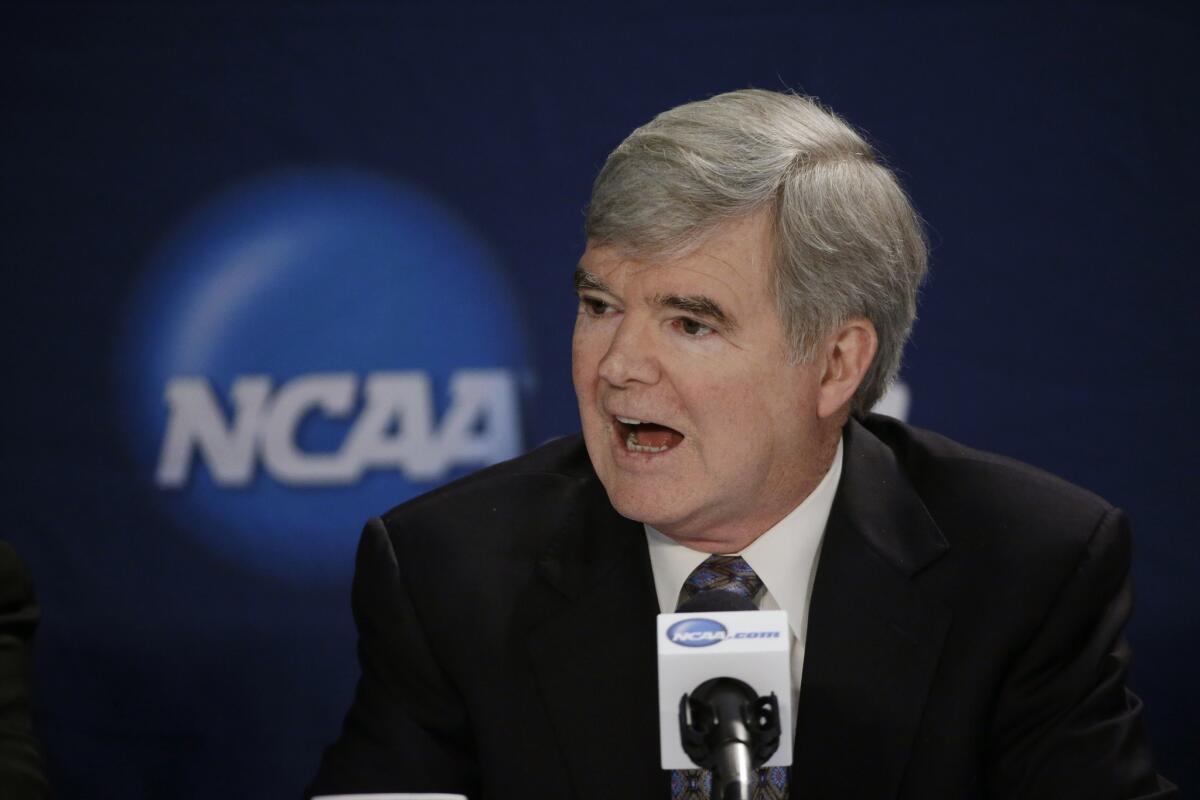NCAA president emphasizes belief that student-athletes are ‘amateurs’

NCAA President Mark Emmert took the stand at the Ed O’Bannon trial Thursday and reasserted his belief that student-athletes are indeed amateurs and should not be paid.
- Share via
Taking the witness stand Thursday in the Ed O’Bannon case, NCAA President Mark Emmert emphasized his belief that student-athletes are “amateurs” because they are not paid to play and because they operate in the broader context of a university setting, providing those institutions with “social cohesion.”
Under friendly questioning, Emmert spoke of NCAA “core values” that date back more than a century and, he contends, are still firmly in place.
They are “first and foremost that the participants in college athletics have to be full-time students at their universities participating in sport, and second that they be amateurs, that they not be professionals,” Emmert said.
Emmert’s highly anticipated testimony came on the ninth day of a bench trial in the class-action suit filed on behalf of former and current Division I men’s basketball and football players. They are seeking an injunction against the NCAA that would effectively allow them to profit from the use of their names, images and likenesses in television broadcasts, rebroadcasts, video games and more.
The case alleges that by agreeing on a blanket prohibition on commercial benefit to student-athletes, the NCAA and its member colleges and conferences engage in price-fixing and refusal to deal in violation of the Sherman Act. O’Bannon, the former UCLA basketball star and lead plaintiff, watched Thursday from the counsel table.
Emmert said lifting restrictions barring student-athletes from prospering from college athletics would not only strike at NCAA core values, but lead to unfair competition among member schools and conferences, drive teams out of Division I and kill the fan base.
Emmert said he could accept schools providing a “miscellaneous expense allowance” to student-athletes to more thoroughly cover their cost of attendance beyond tuition, books, and room and board — an idea currently being debated. However, he said, any benefits “above and beyond the cost of being a student” would cross a philosophical line.
“Now you’ve moved into the realm where you are compensating a student-athlete for something other than being a student,” he said. “You’ve now moved into pay for play.”
When plaintiffs’ attorney Bill Isaacson rose to cross-examine Emmert, he quickly turned to correspondence from Wally Renfro, a longtime NCAA executive who was a vice president and lead policy adviser when Emmert was selected president in 2010, along with other internal NCAA documents.
Isaacson said the documents showed a pattern of active dialogue, hand-wringing and dismay by NCAA officials over public perceptions of “hypocrisy” for allowing vigorous commercialization of collegiate athletics while maintaining that amateurism was a sacrosanct line that could not be crossed.
Isaacson pointed to a speech in 2003 by then-NCAA President Myles Brand describing over-commercialization as “the primary threat to the integrity of college sports”; a 2009 speech noting that concerns over commercialism were “certainly approaching” crisis; and a 2010 email from Renfro to Emmert where Renfro wrote frankly of the “commercial exploitation” of student-athletes.
“It’s a fairness issue and along with the notion that athletes are students is the great hypocrisy of intercollegiate athletics,” he wrote, asking Emmert — rhetorically, Emmert asserted — where he would stake his territory on the topic.
Another internal document said the “horse is already not only out of the barn,” on commercialism, “it is in an entirely different state.”
Policy documents and reports by the Knight Commission revealed dialogue over how to restore lost balance, as did one 2007 internal email to top NCAA executives that discussed the use of student names images and likenesses. “The presidents want it both ways,” the email said. “They want to be able to rail against commercialism and they want the revenue that comes with commercial advertisers.”
Under repeated questioning, however, Emmert declined to change his opinion, saying that he acknowledged a longstanding debate on commercialism but did not agree that the fight was lost or the slope slippery.
Asked by Judge Claudia Wilken how he defined commercial exploitation of student-athletes, Emmert said that allowing student-athletes to “shill” for products in exchange for compensation would convert them into professionals.
“They’re no longer a student-athlete, they’re no longer part of an academic environment. They’re there now not avocationally but vocationally … to make a living,” he said.
Outside court, Isaacson said that the NCAA internal documents indicate that holding onto traditions of amateurism “is not a defense. … They’re saying ‘we need amateurism to be popular. Nonsense. The only thing that’s actually hurting the popularity of your sport is the perception of hypocrisy.”
Isaacson will continue to question Emmert on Friday.
More to Read
Go beyond the scoreboard
Get the latest on L.A.'s teams in the daily Sports Report newsletter.
You may occasionally receive promotional content from the Los Angeles Times.











